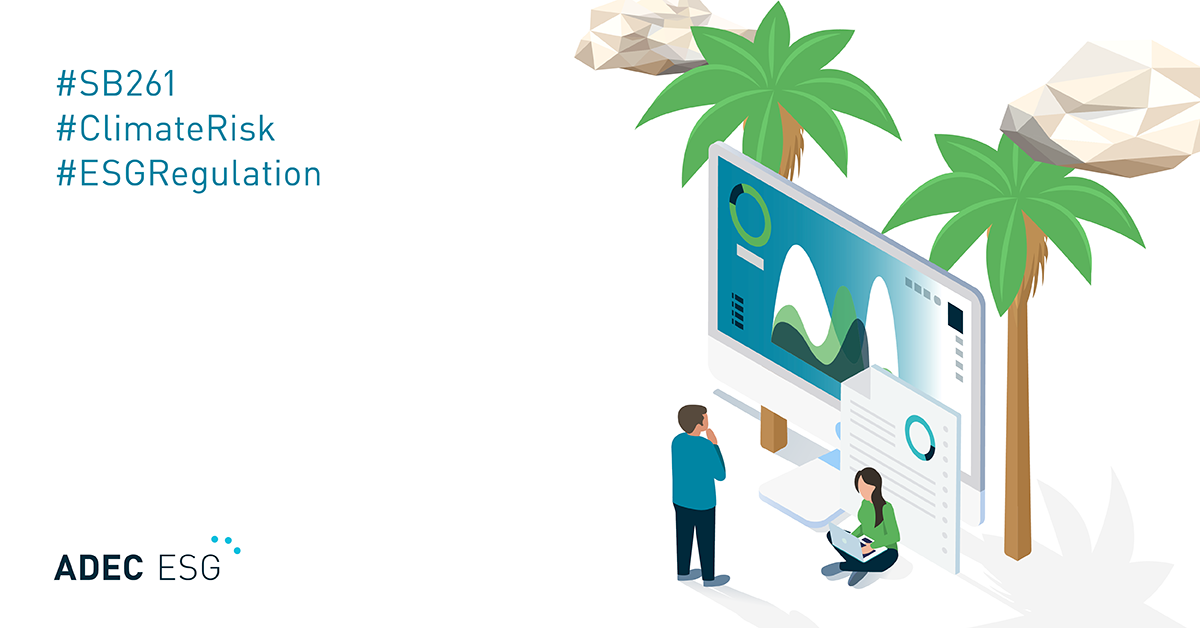At the beginning of 2023, California introduced two complementary bills under its Climate Accountability Package: the Climate Corporate Data Accountability Act (SB-253) and the Climate-Related Financial Risk Act (SB 261).
SB 253 provides the framework for reporting and disclosure of greenhouse gas (GHG) emissions data while SB 261 outlines the guidelines for public disclosure of climate-related financial risk.
SB 253, which was signed into law in October of 2023, requires that the California Air Resources Board (CARB) adopt regulations that require business entities—such as partnerships, corporations, and LLC’s—operating in California with total annual revenues more than $1 billion to publicly disclose scope 1 and scope 2 emissions data. Additional requirements for disclosure of scope 3 inventories will be introduced as the plan advances.
Timeline for implementation
SB 253 requires CARB, on or before January 1, 2025, to develop and adopt a regulation outlining the processes and procedures for public disclosure of GHGs from reporting entities that have total annual revenues in excess of $1 billion.
Subsequently, the disclosure of scope 1 and scope 2 emissions from reporting entities will need to occur starting in 2026 with annual reporting requirements moving forward. Additionally, beginning in 2027, the bill will require annual reporting of scope 3 emissions in addition to the scope 1 and 2 GHG inventories.
GHG reporting criteria
The reporting criteria framework outlined in SB 253 aligns with other regulatory and non-regulatory programs worldwide. Key reporting criteria identified in SB 253 include:
1. Reporting standards
The criteria established in SB 253 are primarily based on the WRI/WBCSD GHG Protocol and WRI/WBCSD Corporate Value Chain (Scope 3) Accounting and Reporting Standard. The WRI standards are commonly used by organizations to report and track annual GHG emissions.
2. Reporting framework
SB 253 requires that reporting entities annually report emissions to an emissions reporting organization, which is defined as a pre-designated nonprofit organization that currently operates a GHG emissions reporting organization and has experience with GHG disclosure by entities operating in California. The emissions reporting organization will offer the platform for public disclosure of annual GHG emissions from reporting entities.
3. Independent third-party verification
In addition to reporting requirements, reporting entities are also required to obtain independent third-party assurance from providers with extensive experience in measuring, analyzing, reporting, or attesting to information related to GHG emissions.
4. Level of assurance
SB 253 also establishes assurance criteria to determine the depth and detail of third-party verification of GHG emissions from scope 1 and scope 2 inventories. Generally, two levels of assurance are recognized with respect to verification of GHGs from business operations: reasonable and limited. Reasonable assurance generates the highest level of confidence, while limited assurance implies a lower level of confidence. Additionally, SB 253 directs CARB to establish a limited assurance standard for scope 3 emissions beginning in 2030. Scope 1 and 2 emissions will likely fall under a reasonable assurance engagement.
General considerations for reporting entities
SB 253 has the potential to impact 5,344 organizations within California, per the SB 253 Senate Floor Analyses from September of last year. SB 253 is likely to become a first-in-the-nation measure to institute broad, sweeping regulatory requirements for organizations meeting the mandatory reporting criteria. Highlighted are five key considerations for entities potentially subject to SB-253.
1. Definition of “doing business”
This term is broadly defined as engaging in any transaction for the purpose of financial gain within California, being organized or commercially domiciled in California, or having California sales, property or payroll exceed specified amounts: as of 2020 being $610,395, $61,040, and $61,040, respectively. The expectation is that regulatory clarity will emerge when the language is drafted, but this will likely capture a large portion of businesses from a variety of sectors.
2. Estimated costs for implementation
Anticipated costs for administration of the program range from $3 million in fiscal year (FY) 2023-24 up to $6.9 million in FY 2025-26. The program will implement administrative fees on an annual basis to cover program administration as well as institute administrative penalties for failure to submit annual GHG reports not to exceed $500,000 during the applicable reporting year. Annual fees will be directed to the Climate Accountability and Emissions Disclosure Fund. Organizations should expect to allocate monetary resources to GHG inventory development, program administration, and third-party verification.
3. Organizations currently reporting GHG emissions
If an organization is voluntarily reporting emissions under limited assurance engagements, it should consider verifying emissions to a higher assurance level. While SB 253 does not directly address the assurance levels for scope 1 and 2 inventories, it will likely fall in line with the WRI GHG Protocol. Organizations that transition from limited assurance to reasonable assurance engagements prior to SB 253 implementation will be better positioned to report to a regulatory framework.
4. Organizations NOT currently reporting GHG emissions
Development of GHG inventories is often a lengthy process in terms of gathering and processing activity data from various sources such as natural gas consumption, electricity consumption, and financial data. Organizations should consider developing an inventory either programmatically or non-programmatically to be independently verified ahead of potential regulation. Having a complete, accurate, and verified inventory will ensure a smooth transition to a regulatory program.
5. Organizations NOT currently reporting Scope 3 emissions
Scope 3 GHG inventory development is often a complex and labor-intensive process. Organizations should consider developing an inventory ahead of the impending regulation to prepare for reporting in 2030.
Additional considerations (SB 261)
Organizations not currently obligated to report emissions under SB 253 will also need to consider if they meet the reporting requirements under SB 261. The revenue threshold is significantly lower than that of SB 253 and requires entities conducting business in California, with revenue greater than or equal to $500 million, to report and disclose climate-related financial information.
The legislation mandates that a covered entity, as defined, must annually produce a climate-related financial risk report, commencing on or before January 1, 2026, and subsequently every two years. This report should disclose the entity’s climate-related financial risk and outline measures taken to mitigate and adapt to such risks. Additionally, the bill stipulates that the covered entity must make the report accessible to the public on its official website. The SB 261 framework is aligned with the Task Force on Climate-Related Financial Disclosures (TCFD), which outlines disclosure related to risk assessment, capital allocation, and strategic planning.
Conclusion
As the impacts of climate change continue to advance, regulatory frameworks like SB 253 and SB 261are likely to become common practice for entities with large GHG and financial footprints. Companies should prepare for the impending regulation by engaging with experienced and trusted environmental professionals for third-party assurance, development of GHG inventories, and assessment of climate-related financial risk.
ADEC ESG supports global companies as they work towards their sustainability goals and rise to meet ever-growing ESG reporting requirements. From frameworks like CDP to regulatory mandates like the SEC’s climate rule, SB 253, and SB 261, our experts provide our clients with an integrated perspective informed by in-depth ESG reporting and disclosure experience. Talk to our team today to find out how we can help you meet your ESG goals.




